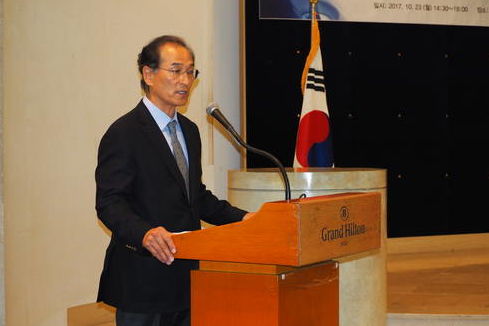Workshop
German-Korean Workshop - Crisis Management on the Korean Peninsula and the German Views
Prof. Dr. Shin, Jin
So, the topic of this event was appropriately chosen: “Crisis Management on the Korean Peninsula and the German Views”. Witnesses of German unification as well as politicians and other political experts, such as Peter Keup from the Federal Foundation for the Reappraisal of the SED Dictatorship, Son Sun-Hong, former head of mission in Hamburg, Hartmut Koschyk, member of the Bundestag, and Lee Sangmin, head of the Korean-German friendship group in the National Assembly of the Republic of Korea, took part in the panel.
After singing the national anthems of both Republic of Korea and Germany Prof. Dr. Shin, Jin, director of the Institute for Peace Affairs, mentioned long and successful cooperation of IPA and Hanns Seidel Foundation in preparation of Korean unification in his welcoming remarks. Dr. Susanne Luther, director of the Institute for International Cooperation of the Hanns Seidel Foundation, also opened the event, pointing out the importance our foundation’s role in the peaceful reunification of Korea especially in times of such crises and threats. According to the President of the IPA, Dr. Shin Yeong Seok, negotiations with the current regime are highly difficult. Germany’s ambassador to Korea, Stephan Auer, mentioned that with currently intensifying conflicts in Korean a peaceful solution has to be aimed at. But this would only be possible if inner state discussions were obtained.
[Translate to English:] Dr. Susanne Luther
The discussion of two important topics, namely the experiences of the German reunification and the current situation on the Korean peninsula, moderated by Hong Yang-Ho, former Vice Minister of Unification, started with Peter Keup’s contribution demonstrating his personal experiences as witness of the German reunification. Policies of convergence, especially by former Chancellor Willy Brandt, prevented East and West Germany to drift apart. However, the new and very important challenges came with the reunification, including how to cope with the SED regime and its misdeeds. Systematic reappraisals were the key to successful a reunification. Son Sun-Hong held a presentation about the lessons taken from the German reunification and the Korean strategy on how to reunite Korea peacefully. MP Hartmut Koschyk emphasized the importance of foundations like HSF as political instruments and the role they play in crises. He then explained the main causes of the current crisis, namely lacking consideration and missing continuity of the South Korean policy; a continuous One-Korea policy would have been necessary. There is still high potential in North East Asia and the whole region would benefit from Korean reconciliation and cooperation. Finally, Mr. Koschyk mentioned that Germany has always been supporting Korea and that this support will also remain in the future. In his speech Lee Sangmin made clear, he is sure that the Korean reunification will happen, although the current crisis is very difficult to solve. He praised the German unification, where in contrast to Korea the situation constantly improved. He pointed out that economic and scientific exchanges are a way to have influence on the current circumstances before making political interventions. However, lessons and experiences from the German example are still needed. In his final words Lee Sangmin also urged the HSF to act as a national and international arbitrator or at least to further support such mediations.


![[Translate to English:] Dr. Susanne Luther](https://korea.hss.de/fileadmin/user_upload/2_Dr._Susanne_Luther_ab7c329eec.jpg)